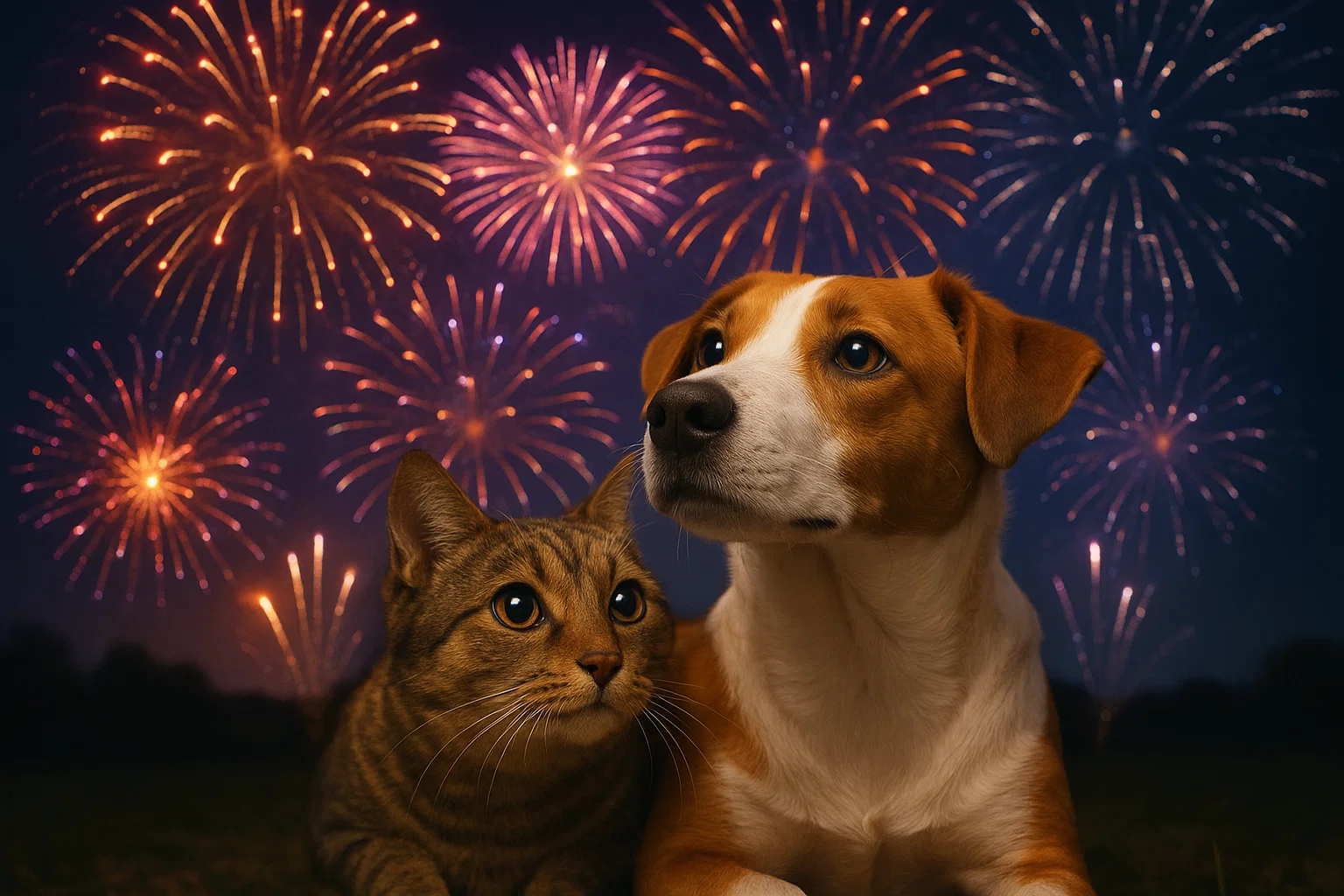Every autumn and winter in the UK you’ll spot bunting and bonfires — Bonfire Night (Guy Fawkes, Nov 5) and Diwali are the big ones, and many towns hold organised firework displays. In the US the Fourth of July is synonymous with fireworks, and New Year’s Eve brings more worldwide light shows. Across Europe, Bastille Day in France, local summer fêtes and New Year celebrations commonly include fireworks too. Those bright displays are part of a seasonal tradition for people, but for many animals they’re deeply stressful.
Why humans love fireworks — and pets don’t
Fireworks are designed to surprise: loud bangs, sudden rattles, bright flashes and unfamiliar smells. For people, this combination is thrilling; for animals, it’s unpredictable and often terrifying. Sounds and lights that we experience as short-lived spectacles can trigger a strong fear response in pets because animals interpret sudden sensory change as potential danger. Major veterinary charities in the UK and the US publish similar advice: keep pets indoors, reduce noise and provide safe spaces during displays.
What causes pets to fear fireworks?
There are several reasons pets react so strongly to fireworks:
- Startle and unpredictability: Fireworks come without warning — animals can’t reason “it’s just a show.” Sudden loud noises trigger the ancient fight/flight/freeze response.
- Sensitivity of hearing: Dogs in particular, hear higher frequencies and quieter sounds than humans; booms are more intense for them.
- Negative past experiences: If a pet once panicked during loud noise, they may associate similar sounds with danger and develop a lasting noise phobia.
- Smell and visual cues: The smell of smoke and fumes, plus sudden flashes, can add to confusion and distress.
What does it feel like for a pet?
Imagine being in a world where noises are louder, directions are confusing, and there’s no explanation — that’s similar to what a frightened pet experiences. Vets describe it as acute anxiety: racing heart, trembling, panting, disorientation and sometimes nausea. In extreme cases, animals can injure themselves trying to escape or choke (there are tragic reports of animals fatally affected by panic during fireworks).
Typical behaviours during fireworks
Animals may react in a variety of ways:
- Dogs: pacing, drooling, shaking, trying to hide or run away, chewing through doors or leads, barking or howling. Some may toilet indoors.
- Cats: often hide — under beds, in cupboards or behind furniture — and may refuse to eat or come out for hours.
- Small mammals and birds: freeze, hide, or show very subtle signs of stress (less movement, loss of appetite). Rabbits or guinea pigs in outdoor hutches can be particularly vulnerable.
- Livestock & wildlife: horses, sheep and birds can bolt or injure themselves; wildlife can be displaced from nesting or feeding areas.
Why some pets aren’t affected
Not every animal reacts. Reasons include:
- Early positive exposure/desensitisation: pets gradually habituated to noise in a controlled way may remain calm.
- Personality differences: some animals are naturally more bold or less noise-sensitive.
- Age and health: very young or older animals may show different responses; sometimes, reduced hearing in older pets lessens the impact.
- Environment during exposure: a quiet, secure home with masking noise can dramatically reduce stress for some pets.
Practical steps to help pets when it’s firework season
There are several evidence-backed, practical tips you can use straight away.
- Plan ahead — keep pets indoors. Close windows and curtains, block cat flaps and bring outdoor pets inside where possible. Early walks (daylight) reduce the chance of being out when fireworks start.
- Create a “safe den.” Give your pet a quiet space with familiar bedding, toys, and an item that smells like you. Some dogs benefit from an enclosed crate with a cover; rabbits and small furries should be moved to a secure, interior room (PDSA)
- Mask the noise. Turn on the radio or TV at a comfortable volume, use white-noise or calming music and switch on the lights to reduce the contrast of flashes. Do not blast sound so loud it becomes a stressor itself (The Kennel Club).
- Stay calm and behave normally. If you remain calm your pet is more likely to feel safe; comfort them if they seek you but avoid reinforcing panic with excessive fuss if that seems to increase their distress.
- Desensitisation training (long-term). Gradual, reward-based exposure to recorded firework sounds can help reduce phobia over weeks/months. Seek a qualified trainer or behaviourist for a structured programme.
- Ask your vet about medication or pheromones. For severe phobias, vets may prescribe short-termmedication or recommend calming pheromone products — always get professional advice before medicating!
- Identification & microchipping. Make sure collars, ID tags and microchip details are up to date in case your pet bolts. Keep leads and harnesses secure during outings around known display times.
- Protect small and outdoor-only animals. Move hutches indoors or double-layer covers to muffle sound; ensure birds and livestock have shelter and are not left exposed.
- Thunder vests - Often used for general anxiety in pets, there is some merit to the use of Thunder vests during fireworks to calm the nerves and relax your pet.
Final thought
Fireworks are a joyful tradition for many people, but they can be terrifying for animals. A few practical adjustments — bringing pets inside, making a comfy den, masking noise, and planning — will keep most pets much safer and calmer. For animals with severe noise phobia, consult your vet or a qualified behaviourist early so you can plan a long-term approach.
Further reading & resources
- RSPCA: Keeping dogs, cats and small pets safe during fireworks. RSPCA
- Blue Cross: Fireworks and pets — practical tips. Blue Cross
- PDSA: Pets and fireworks advice (sub-divided by pet type). PDSA
- ASPCA: Managing pet anxiety during fireworks. ASPCA
- AVMA: July 4 / holiday safety for pets. avma.org
- Guardian report on fireworks’ impact on zoo animals (case highlighting real-world risks). The Guardian
